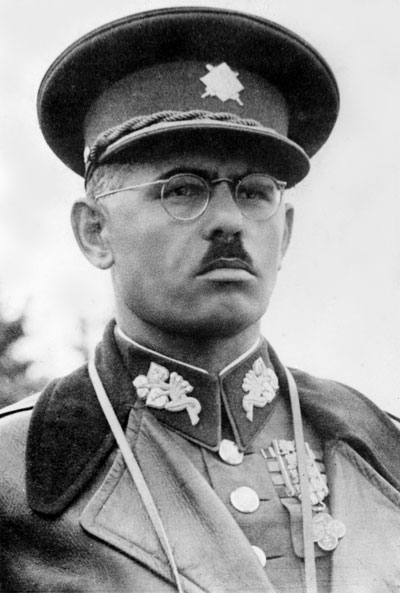Capajev? Ta skupina operovala aj v nasich vrchoch, ale tie su na vychode Slovenska.
Zaujimave citanie.
26.3. 1891 General Vojtěch Boris Luža
Categories: Personalities , Second World War , First World War , Calendar
 He was the only Czechoslovak general to fall during the Second World War with a gun in his hand. To this day he is one of the most prominent natives of Uherský Brod. Legionnaire Vojtěch Boris Luža was born on 26 March 1891.
He was the only Czechoslovak general to fall during the Second World War with a gun in his hand. To this day he is one of the most prominent natives of Uherský Brod. Legionnaire Vojtěch Boris Luža was born on 26 March 1891.
After studying at the Provincial Higher Real Gymnasium, he was admitted to the Czech Technical University in Brno to study electronic engineering. However, he did not finish it because he was called up to the 35th Pilsen Infantry Regiment on 15 July 1914 and was sent to the Russian front as a platoon commander in the autumn. In August 1915 he ended up in a prisoner of war camp near Tarnopol and eventually joined the Serbian army. He then joined the Czechoslovak army in January 1917 after recovering from his wounds. He took part in the memorable Battle of Zborov.
He remained in the army after the war and took command of the 5th TGM Infantry Regiment based in Prague's Smichov. He studied at a military college and was promoted to colonel of the general staff. In 1937 he was even promoted to division general and appointed regional military commander in Brno.
"He held the post until the liquidation of the Czechoslovak army in the summer of 1939. On 30 June 1939, he was discharged from the Czechoslovak armed forces at the rank of division general and subsequently assigned to the Provincial Office in Brno, from 1 December 1939 to 31 December 1939. He was employed as deputy head of the provincial technical service for Moravia from 31 March 1941, after which he retired at his own request," says the Internet Encyclopedia of the History of Brno.
He then joined the anti-Nazi resistance. During World War II, 24 Czechoslovak generals were murdered by the Germans. General Luža was the only one who died with a gun in his hand. "The leader of the resistance of the Council of Three, Vojtěch Boris Luža, moved with Lieutenant Josef Koreš from Prague to the Highlands. On October 2, 1944, they arrived in the rain after an exhausting march to the village of Hřiště near Přibyslav. Because they wanted to rest, they asked for help from the locals, and the mayor referred them to an inn," Roman and Milan Plch describe the events in their book The Secret Places of Nazism.
The mayor was worried about whether they were provocateurs and reported them to a gendarme he met. He called for reinforcements from Přibyslav and the three of them stormed the inn with guns in their hands. A gunfight broke out in which General Luža was shot on the spot, Lieutenant Koreš managed to escape but shot himself in the field.
"The constable himself was disturbed by the whole situation, stating that he had never shot anyone in his life. A report to the Gestapo followed, and only then did it become clear who had been killed in the battle. The news spread quickly and the Council of Three decided to take revenge. Twelve members of the partisan group Chapayev, including General Luzha's son, were ambushed on the evening of 26. After the verdict was passed, all five Czech gendarmes were taken one by one to the cellar where they were shot. Only one managed to survive," the Plchs write.
Roman Plch and Milan Plch: Secret Places of Nazism, www.ub.cz, https://encyklopedie.brna.cz/
The article is included in categories:
- Archive of articles > Personalities
- Archive of articles > Wars > Second World War
- Archive of articles > Wars > First World War
- Archive of articles > Calendar
Post
Smutný příběh. Partyzáni se tu teda vyznamenali.Popravit četníky, kteří dělali jenom svou práci a min 2 tam ani nebyli. Starosta bez komentáře.
Byl to velký člověk a vlastenec.Četl jsem jeho životopis.Dnes nám bohužel takoví lidé chybí. 







